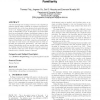269 search results - page 34 / 54 » Who Thinks Who Knows Who |
IH
2004
Springer
14 years 22 days ago
2004
Springer
Abstract. Existing navigation services, such as GPS, offer no signalintegrity (anti-spoof) protection for the general public, especially not with systems for remote attestation of...
COSIT
2003
Springer
14 years 18 days ago
2003
Springer
: Natural language requests involving vague spatial concepts are not easily communicated to a GIS because the meaning of spatial concepts depends largely on the contexts (such as t...
ICSE
2010
IEEE-ACM
14 years 5 days ago
2010
IEEE-ACM
The size and high rate of change of source code comprising a software system make it difficult for software developers to keep up with who on the team knows about particular parts...
IWPC
2000
IEEE
13 years 11 months ago
2000
IEEE
ng the Accessor Classification Approach to Detect Abstract Data Types icle presents an approach to identify abstract data types (ADTs) in source code. For each structured type de�...
KBSE
2000
IEEE
13 years 11 months ago
2000
IEEE
Little-JIL, a new language for programming the coordination of agents is an executable, high-level process programming language with a formal (yet graphical) syntax and rigorously...

